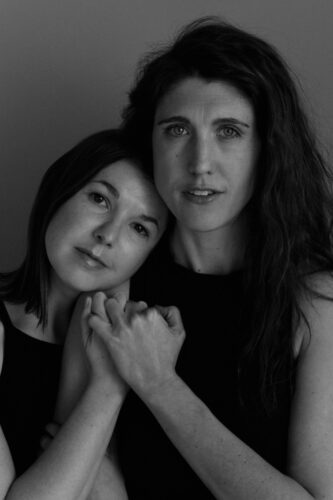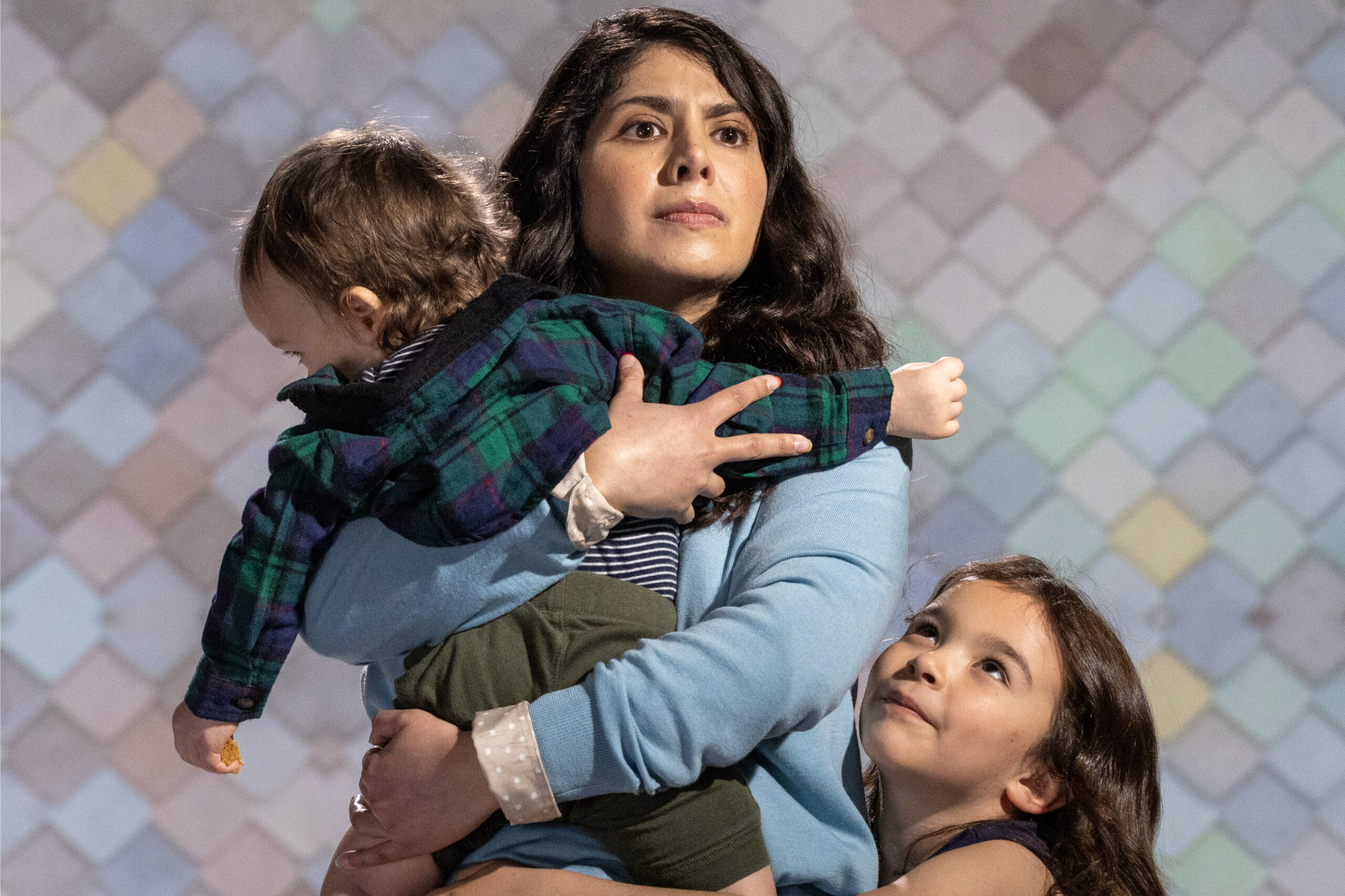When Amy Nostbakken and Norah Sadava began creating a show about the lack of affordable, flexible, and available child care, they didn’t have children of their own. Now, as their concert-theatre hybrid show begins its run at Canadian Stage, they have three kids under the age of 4 between them—and a firsthand understanding of the nightmare of inaccessible, unaffordable child care.
Universal Child Care tells the stories of four families across Canada, USA, the UK, and Japan, and a caregiver from Mexico. Each faces a different struggle: a couple’s massive hospital bill following the birth of their child, leaving them thousands of dollars in debt. A woman losing her job after taking parental leave. A single mother facing unfair daycare policies and fighting for custody of her child. A biracial queer couple forced to leave the high costs of child care in a city for an intolerant small town.

Photo by Dahlia Katz
These stories are real, based on interviews Nostbakken and Sadava conducted with parents and caregivers from around the world. What they learned was eye-opening, and enraging.
“They’re just regular folks who make regular incomes, who are fucked because of the federal policies,” Nostbakken says.
The show is a window into the real-life consequences of these policies for four families. One story shows the crushing impact of the lack of mandated parental leave in the USA, as a woman is forced to return to work only two weeks after giving birth, the scars from her C-Section still fresh.
“This is the effect of not caring,” Nostbakken says. “This is the effect of not making women our priority. Mothers our priority. Parents our priority. Caregivers our priority. Children our priority. Don’t we claim to care about babies and children? If we care about them, shouldn’t we care about the people who are taking care of them?”

Photo by Dahlia Katz
While Nostbakken and Sadava were creating the show, Canada’s “$10-a-day” child care plan came into effect. While the policy might seem like a step in the right direction, more parents are having difficulty finding an available spot for their child. In 2023, 26% of children 5 and under were on a waitlist for child care—a wait that Sadava herself is familiar with.
“I put my child on 15 daycare waiting lists when I was three months pregnant. When she was almost two years old, I still hadn’t gotten the spot,” Sadava says. “It seems so absurd that there can be such a shortage but when you understand what caregivers are being paid…it’s a complete travesty. No one wants to go into the field because it’s so hard for so little reward.”
Universal Child Care artfully unpacks so many issues that stem from a lack of affordable, accessible child care—and they do it all through, as Nostbakken describes, “eight naked voices singing in harmony and dissonance…shouting and screaming and singing.”

Photo by Dahlia Katz
The show is a mix of musical numbers, frantic monologues, silent storytelling, comedic bits, shocking facts and statistics, and sometimes, just screaming at the frustration of it all. For Nostbakken, these theatrics reflect the intensity of having a child, the shock of the hardships, but also the immense love and joy. “You feel frustration, you feel isolated, you feel joy, you feel resentment, you feel imbalanced…all those emotions are too big for words.”
Through their performance company, Quote Unquote Collective, Nostbakken and Sadava have crafted several productions focused on women’s stories. Mouthpiece, their award-winning theatrical production, was recognized internationally as a compelling portrait of inner conflict and mother-daughter relationships, earning praise from Jodie Foster and a film adaptation that premiered at TIFF in 2018. Their next production Now You See Her continued their feminist storytelling, exploring the ways women fade from sight in our culture.

There’s no doubt that child care continues to be a major barrier to the ability of women to fully participate in society. “By a landslide, women and people who identify as women who bear the brunt of this labour, this invisible labour, this unpaid labour, this unvalued labour,” Nostbakken says. “How is this possible? It’s 2024, and these archaic gender roles are still so ingrained in how society functions.”
Nostbakken and Sadava hope that the show can begin to shift how people think about child care to viewing it is a basic right, on par with healthcare. “We really believe that true change starts from a person having a little a-ha moment,” Sadava says.
“That kind of mental shift, it won’t necessarily come from reading headlines,” adds Nostbakken. “It may come from watching these people who you care about on stage going through it.”
Universal Child Care runs from February 13th – February 25th at the Canadian Stage Berkeley Street Theatre.




 Follow Us On Instagram
Follow Us On Instagram
